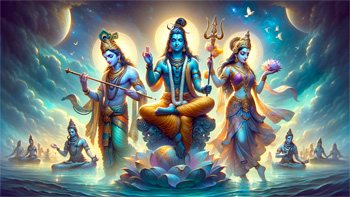The pantheon of Hindu deities is as diverse and colorful as the many festivals that celebrate them. Hinduism, one of the world's oldest religions, boasts an extensive array of gods and goddesses, each embodying different aspects of life and the cosmos. From the powerful trinity of Brahma, Vishnu, and Shiva to the fierce and nurturing goddesses like Durga and Kali, each deity has a unique narrative and significance that resonates with the followers of Hinduism worldwide. This article delves into the intricate tapestry of Hindu mythology and the festive celebrations that honor these divine figures.
The Trinity of Creation, Preservation, and Destruction
In the realm of Hinduism, the trinity of Brahma, Vishnu, and Shiva holds a place of great reverence. Brahma, the creator, brings the universe into existence, setting the stage for the cosmic play. Vishnu, the preserver, embodies the principle of sustenance, maintaining balance and order. Shiva, the destroyer, is the agent of change and transformation, essential for the cycle of creation to continue. Each deity in this trinity has associated myths that detail their roles in the universe and their interactions with other gods, humans, and demons. Festivals like Maha Shivaratri celebrate Shiva's power, while Vaikuntha Ekadashi is dedicated to Vishnu's glory.
The Goddesses of Strength and Compassion
Hindu goddesses, or Devi, are as complex and powerful as their male counterparts. Durga, the invincible mother, is worshipped for her strength and protection, most famously during the nine nights of Navaratri, when her victory over evil is celebrated. Kali, often depicted with a fierce demeanor, embodies the transformative power of destruction, clearing the path for new growth. Saraswati, the serene goddess of knowledge and arts, is revered by students and artists, particularly during Vasant Panchami when her blessings are sought for intellectual and creative endeavors.
The Benevolent Protectors and Providers
Ganesha, the elephant-headed god, is adored as the remover of obstacles and the patron of new beginnings. His birth is celebrated with great pomp during Ganesh Chaturthi, especially in Maharashtra, India. Hanuman, the monkey god, epitomizes devotion and strength. Hanuman Jayanti marks his birth and celebrates his unwavering dedication to Lord Rama. Lakshmi, the goddess of wealth and prosperity, is central to Diwali festivities, where her blessings are invoked for material and spiritual abundance.
Seasonal Festivals and the Divine
The Hindu calendar is punctuated with festivals that honor the deities in accordance with the seasons. Holi, the festival of colors, heralds the arrival of spring and commemorates the divine love between Krishna and Radha. In the autumn, Diwali, the festival of lights, is observed in honor of Rama's return to Ayodhya and represents the victory of light over darkness. These seasonal celebrations not only venerate the gods but also foster a connection between the divine, nature, and the community.
Regional Variations and Local Deities
The worship of Hindu deities is not monolithic and varies widely across regions. Local deities, like the village goddesses or gramadevatas, are deeply rooted in the culture and daily life of the people. Festivals like Pongal in Tamil Nadu and Onam in Kerala are centered around regional gods and agricultural cycles. These celebrations reflect the localized expressions of faith and the integral role deities play in the cultural fabric of the community.
Deities in Epics and Scriptures
The epics of the Mahabharata and the Ramayana, along with the Puranas, are rich sources of divine tales. These scriptures recount the exploits of gods and heroes, weaving stories that have shaped the moral and spiritual landscape of Hinduism. The dramatic narratives, battles between gods and demons, and philosophical discourses found in these texts are brought to life during festivals, through dance, drama, and recitation, making the deities and their stories accessible and relatable to all.
Modern-Day Worship and Its Evolution
In today's fast-paced world, the worship of Hindu deities has adapted to new forms and mediums. Virtual temples, online darshans, and app-based rituals have made it easier for the diaspora to stay connected to their faith. Yet, the essence of worship remains rooted in tradition, with daily pujas, temple visits, and the observance of holidays like Janmashtami and Shivratri continuing to play a vital role in the lives of the faithful.
The legacy of Hindu deities is not just limited to the realms of mythology and religion; it extends to art, literature, and popular culture. Their stories are told and retold, their images depicted in various art forms, and their attributes studied for philosophical insights. As the world becomes more interconnected, the interest in Hindu deities and their celebrations has crossed geographic and cultural boundaries, becoming a part of the global tapestry of spirituality and tradition.
Hindu deities, with their rich mythologies and associated holidays, offer a window into the soul of Hinduism. They serve as symbols of life's myriad facets, guiding humanity with their virtues and teachings. As the world celebrates these divine figures in festivals full of joy, color, and piety, the stories of the deities continue to inspire and guide devotees on their spiritual journeys, making every celebration a testament to the timeless appeal of the Hindu pantheon.
